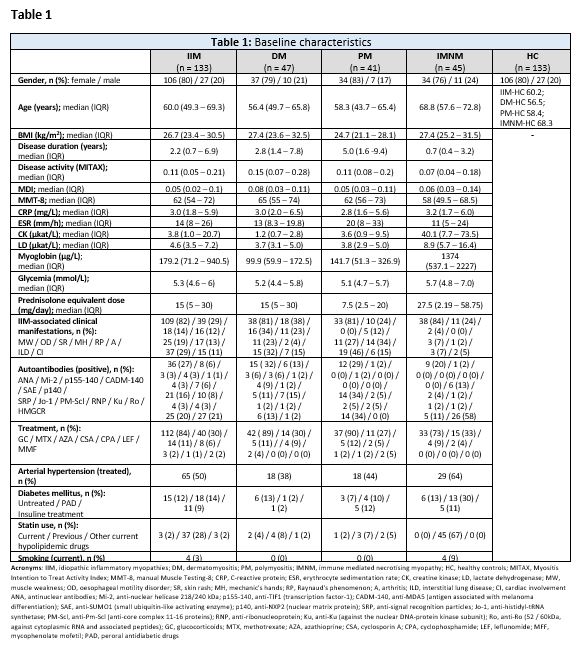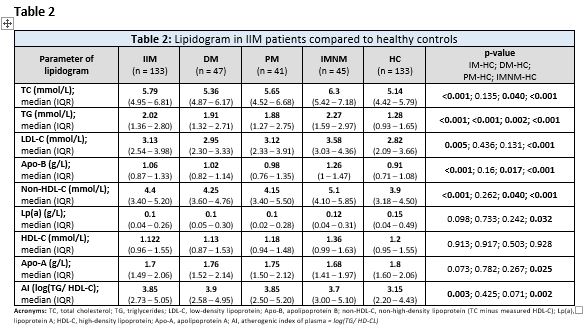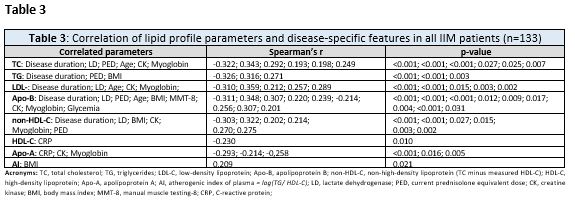Session Information
Session Type: Poster Session C
Session Time: 9:00AM-11:00AM
Background/Purpose: Idiopathic inflammatory myopathies (IIM) are characterized by skeletal muscle and organ involvement and chronic course. Systemic inflammation, limited mobility, and glucocorticoid treatment can have a negative impact on intermediate metabolic pathways, especially on lipid metabolism. The aim of this study was to assess the differences in the lipid profile of IIM patients and healthy controls (HC) and the association with disease-specific features.
Methods: 133 patients with IIM (106 females; mean age 60.3; disease duration 2.2 years; DM 47 / PM 41 / IMNM 45) and 133 age-/sex-matched HC (106 females, mean age 60.2) without rheumatic diseases were included. Patients with DM and PM fulfilled the Bohan/Peter criteria for PM/DM and patients with IMNM fulfilled the ENMC criteria. Levels of selected parameters of lipid metabolism were measured in sera drawn after 8 hours of fasting by routine analytic methods. In IIM patients, disease activity, and damage were evaluated by MITAX and MDI, muscle involvement by manual muscle testing (MMT-8), and comorbidities of interest and current treatment were recorded. Data are presented as median (IQR).
Results: Several differences in disease activity, the dose of glucocorticoids, prevalence of comorbidities, and serum lipid levels were observed among the three subtypes of IIM (table 1). Lipid profile parameters, especially levels of negative cardiovascular predictive markers such as TC, TG, LDL-C, Apo-B, and the atherogenic index, were significantly higher compared to healthy controls. The most significant changes were observed in the IMNM group (compared to the corresponding age-/sex-matched HC) (table 2). Levels of TC, TG, LDL-C, apo-B and nonHDL negatively correlated with disease duration, but positively with laboratory markers of disease activity and the current prednisolone equivalent dose. Higher levels of HDL-C were associated with decreased levels of CRP, which is in line with the negative correlation of apo-A levels with CRP, CK, and myoglobin (table 3).
Conclusion: We have observed significant alterations in serum lipid parameters in our IIM patients compared to healthy age-/sex-matched individuals. Differences were also found among the three subtypes of IIM. These alterations were associated with laboratory parameters of disease activity and the current dose of corticosteroids. Acknowledgement: Supported by AZV NV18-01-00161A, MHCR-00023728, SVV-260373, and GAUK-312218.
 Table 1: Baseline characteristics
Table 1: Baseline characteristics
 Table 2: Lipidogram in IIM patients compared to healthy controls
Table 2: Lipidogram in IIM patients compared to healthy controls
 Table 3: Correlation of lipid profile parameters and disease-specific features in all IIM patients (n=133)
Table 3: Correlation of lipid profile parameters and disease-specific features in all IIM patients (n=133)
To cite this abstract in AMA style:
Oreska S, Storkanova H, Spiritovic M, Hermankova B, Vrablik M, Pavelka K, Šenolt L, Mann H, Vencovský J, Tomcik M. Alterations of Lipid Profile in IIM Patients Are Associated with Disease Activity, Duration, and Glucocorticoid Treatment [abstract]. Arthritis Rheumatol. 2020; 72 (suppl 10). https://acrabstracts.org/abstract/alterations-of-lipid-profile-in-iim-patients-are-associated-with-disease-activity-duration-and-glucocorticoid-treatment/. Accessed .« Back to ACR Convergence 2020
ACR Meeting Abstracts - https://acrabstracts.org/abstract/alterations-of-lipid-profile-in-iim-patients-are-associated-with-disease-activity-duration-and-glucocorticoid-treatment/
